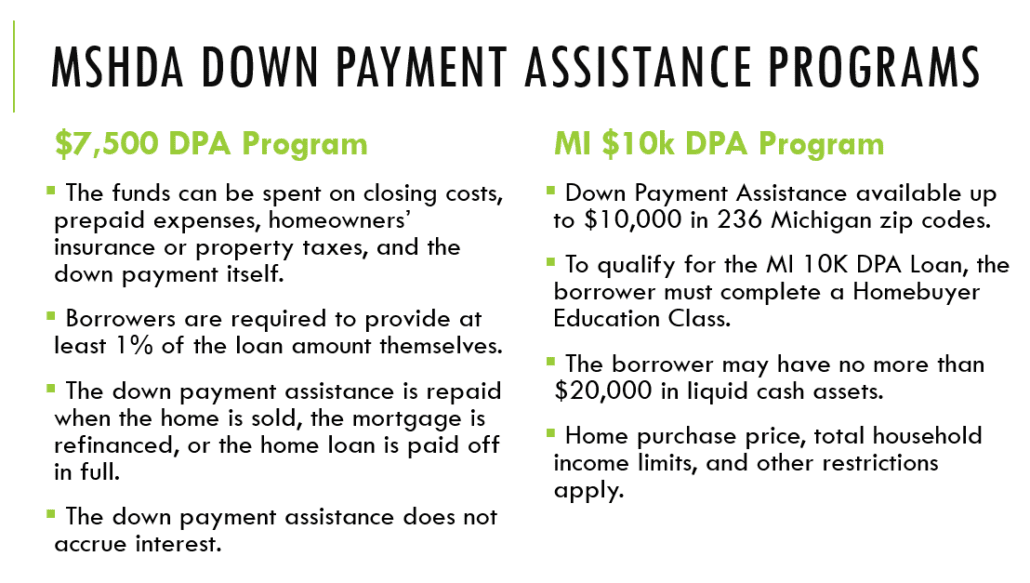Buying a home might be the single biggest purchase you make in your life. You want it to go right. That is why the mortgage lender you choose is critical to making sure your homeownership dreams come true and the experience is hassle-free.
Whether you are a first-time buyer needing assistance through the lending process or you are an existing homeowner seeking to refinance or purchase a vacation home, it pays to go with a local lender as opposed to a big-name national bank or brand.
 Here are 5 reasons to choose a local mortgage lender like Michigan Mortgage.
Here are 5 reasons to choose a local mortgage lender like Michigan Mortgage.
1. Personalized Service
A local mortgage lender gives you the chance to to work face-to-face with an expert, if need be. The growth of digital mortgages, like our Pro SNAP app, has eliminated the need for as much face-to-face meeting in the past, but as a home buyer it can be reassuring to know that your loan officer is right around the corner as opposed to across the country or overseas.
A local lender gets to know you. Your messages won’t sit in a voicemail box unanswered for weeks on end. With Michigan Mortgage, you’ll get a cell number for your loan officer and can call or text them at a moment’s notice to get your questions answered.
2. Local Expertise
Another advantage of local lenders is their familiarity with local market conditions. We know our local neighborhoods, so we know what’s going, what the trends are, and we use that knowledge when helping buyers obtain mortgages.
For example, a national lender with no roots in the local community may be reluctant to approve a mortgage for an atypical property, such as an original farmhouse on acreage that’s now covered by a subdivision. A local lender like Michigan Mortgage will know the history of the area and the changing demographics and economic trends and may be more comfortable underwriting such a loan.
Local lenders also have their finger on the pulse of the local or regional economy, and have a better sense of the lending risks in the area. What looks to a big lender like a dilapidated section of town might actually be an up-and-coming area where properties re increasing in value. Local lenders will know this.
Local lenders may also be more attractive to some home sellers and real estate agents who want an efficient and timely closing. Reputation matters. In situations where several offers are on the table, having a local, trusted lender could be the difference between closing or not closing.
3. Realtor Relationships
Local lenders invest a lot of time and effort building relationships with local Realtors. Realtors and lenders are the yin and yang of real estate. Michigan Mortgage loan officers are on a first-name basis with most of the real estate agents in their local areas.
Also, with everyone on your team – the Realtor, the lender, you– working in proximity, a closing can happen quickly and without hassle. The final stage of home buying is sometimes the most stressful. Having a unified team that is familiar and comfortable with each other can make the process quick and painless.
4. Varied and Specialized Products
Local lenders have a better understanding of property values and the local economy. When you work with Michigan Mortgage, you’re paired with a licensed loan officer and team of professionals who are experts in your region. Our loan officers help you choose the right type of loan for your circumstance and we keep you updated along the way. We have in-house tools and resources to expedite a loan, ensuring everything is taken care of in a timely manner.
Local lenders are where you’ll find the specialized loans the big lenders won’t bother with. Maybe you want an adjustable-rate mortgage with a 15-year lock? Or you want to buy a vacation property that lacks a furnace? Or you want to buy or refinance a home for less than $100,000, an amount too small to be of interest most lenders? Or you want a jumbo loan?
Local lenders are have more flexibility. Big banks need process large numbers of loan applications. To do that, they have rigid guidelines about who they will and won’t lend to. Big banks are more about volume than customer service.
At Michigan Mortgage, we have been Michigan’s leading MSHDA first-time buyer lender for 6 straight years. We are also a recognized USDA rural development leader.
5. Reliable, Responsive & Flexible
Local lenders are better at closing loans on a timely basis. If the closing of a loan has to be extended by a week, local lenders are more flexible than big banks who have corporate mandates to crank out the volume.
Local lenders, along with local real estate agents, have an incentive to provide you with excellent service because they want you to be a referral source for future business. They stake their reputation on each and every customer.
With a local lenders, you are much closer to the decision makers with the authority to approve your mortgage. You aren’t dealing with a corporate bureaucracy.
Michigan Mortgage loan officers are more likely to get personally involved in qualifying you for a mortgage, as opposed to big banks. Often, it’s a matter of the getting to know you. Perhaps you are self-employed with irregular income. Or you have poor credit due to a financial crisis, but have good income and low debt.
Michigan Mortgage loan officers are better suited to be responsible and flexible for borrowers like these.
At Michigan Mortgage, you will never be just a name or number on a loan application. We manage every step of the mortgage process, from application to underwriting to closing, to make the process easy. We have been financing the American homeownership dream for nearly three decades. We can do the same for you.
 Determine your monthly income.
Determine your monthly income.



 Before you start house hunting, it’s crucial to determine how much you can afford to spend on a house. Make sure you factor in all the costs associated with homeownership, such as property taxes, insurance, utilities, and maintenance expenses. You’ll also need to consider your down payment and closing costs. Knowing your budget helps you narrow down your search and ensures you don’t get in over your head with a home you can’t afford.
Before you start house hunting, it’s crucial to determine how much you can afford to spend on a house. Make sure you factor in all the costs associated with homeownership, such as property taxes, insurance, utilities, and maintenance expenses. You’ll also need to consider your down payment and closing costs. Knowing your budget helps you narrow down your search and ensures you don’t get in over your head with a home you can’t afford.
 These loans are backed by the Federal Housing Administration (FHA). This type of loan may be more attractive to someone who has less than perfect credit. They require a down payment of at least 3.5% of the purchase price.
These loans are backed by the Federal Housing Administration (FHA). This type of loan may be more attractive to someone who has less than perfect credit. They require a down payment of at least 3.5% of the purchase price.
 Building equity: As you make mortgage payments, you build equity in your home, which is the difference between your home’s market value and how much you owe on your mortgage. As your equity grows, you can borrow against it or use it to secure a second mortgage.
Building equity: As you make mortgage payments, you build equity in your home, which is the difference between your home’s market value and how much you owe on your mortgage. As your equity grows, you can borrow against it or use it to secure a second mortgage.

 “I knew that we would need to build some sort of credit so we started out with a self-credit builder (a loan that you get but can’t touch until it’s paid back),” she said. “Around February of 2022, my mother went through a divorce and moved into our two-bedroom rental. This is when we decided it was time to start actively looking for a home.”
“I knew that we would need to build some sort of credit so we started out with a self-credit builder (a loan that you get but can’t touch until it’s paid back),” she said. “Around February of 2022, my mother went through a divorce and moved into our two-bedroom rental. This is when we decided it was time to start actively looking for a home.”


 Here are 5 reasons to choose a local mortgage lender like Michigan Mortgage.
Here are 5 reasons to choose a local mortgage lender like Michigan Mortgage. 
 You can enter the market sooner. In today’s market, it’s all about speed and strength. Having a co-borrower added to your mortgage application can increase your buying power and help you enter the competitive market with your best foot forward.
You can enter the market sooner. In today’s market, it’s all about speed and strength. Having a co-borrower added to your mortgage application can increase your buying power and help you enter the competitive market with your best foot forward.